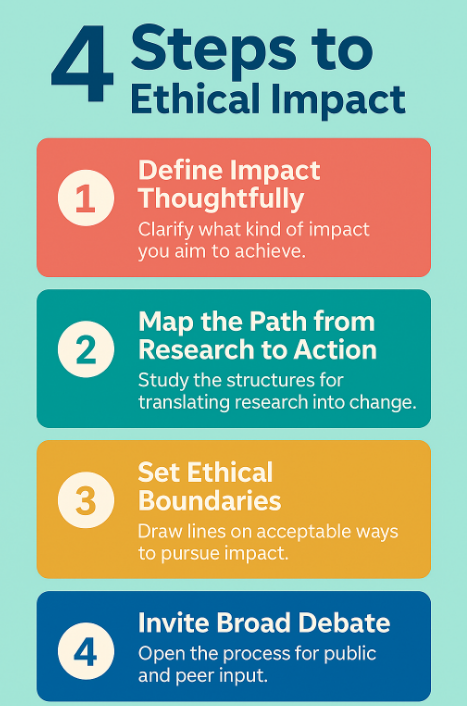
New Research Reveals 4 Keys to Ethical Scientific Impact
A scientist discovers a promising new way to fight disease. A public health researcher develops a strategy to reduce overdose deaths. They don’t just publish—they advocate. They push their work into the world. But here’s the ethical wrinkle: just because research is well-intentioned doesn’t mean it’s ethically done when it changes lives.
We’ve long had research ethics to protect people in studies. But what about ethics for researchers who want to make a difference after the research ends?
A new paper lays out a provocative case: it’s time for a new kind of ethics—one focused on how researchers pursue impact.
Why Now? The Push to Prove Research Matters
Today, researchers are under growing pressure to show that their work doesn’t just fill journals—it changes the world. Governments want returns on public research funding. Universities are ranked by societal “impact.” The Sustainable Development Goals urge scientists to tackle real-world problems, from climate change to inequality.
But this push can backfire. When researchers act as advocates—or even activists—without considering the cultural, political, and social ripples of their actions, good intentions can go wrong.
Imagine a researcher designs a health intervention and gets funders to back it—without involving the local community. The result? Misalignment with local health beliefs. Strain on the health system. Mistrust. Even harm.
The Real Risk: Ethical Blind Spots in Impact
The authors of the new study argue that the current system has a major blind spot. While research ethics cover how to conduct studies responsibly, there’s almost no guidance for how to pursue societal impact ethically.
This is especially tricky in fields like bioethics, where researchers work at the intersection of knowledge, values, and policy. When bioethicists push for change based on normative ideas—what they believe ought to happen—they’re walking a tightrope between scholarly influence and overreach.
And here’s where things get murky: Should researchers just provide knowledge, or is it okay to push for specific policies? What if they use their expert status to sway decisions that rightly belong to elected officials or local communities?
A New Approach: Four Steps to Ethical Impact

To bring clarity to this gray zone, the researchers propose a four-step strategy. It’s not a set of rigid rules—but a flexible, participatory roadmap to ensure ethical reflection before taking action.
1. Define Impact Thoughtfully
Not all impact is equal. The first step is to ask: What do we mean by impact? Who is affected? What kinds of change are we aiming for? Researchers need to combine theoretical insight with real-world understanding to define what “impact” looks like in their field.
2. Map the Path from Research to Action
It’s not enough to say you want to make a difference. Researchers must study the real-world structures that enable—or block—change. Who are the gatekeepers? What are the constraints? This helps identify whether a researcher’s path to impact is even feasible—or if it risks harm.
3. Set Ethical Boundaries
Using insights from political theory, social justice, and research ethics, scholars can draw lines between acceptable and unacceptable impact-seeking behavior. This includes checking motivations (Are you acting for public good or personal gain?), methods (Are communities involved?), and context (Is the intervention culturally sensitive?).
4. Invite Broad Debate
Finally, ethical impact shouldn’t be decided in a vacuum. Researchers must open their process to public and peer scrutiny. This step invites input from communities, policymakers, funders, and other scholars to ensure legitimacy and trust.
So What? Implications for Public Health and Beyond
For public health professionals, this framework couldn’t be more timely. As we face crises like pandemics, mental health challenges, and climate-driven displacement, the demand for action-oriented research is growing.
But without ethical guardrails, even well-meaning efforts can backfire—undermining trust, ignoring local voices, or reinforcing existing inequities.
This new ethics for impact calls us to be not only smart and strategic—but also humble, inclusive, and reflexive. It’s about slowing down to ask hard questions before speeding up to implement solutions.
What’s Next? From Framework to Field Use
This isn’t just philosophy. The authors hope their four-step process becomes a practical tool across disciplines—from health to climate science to education. Future research will need to test and refine it in real-world settings. Institutions can use it to guide grantmaking, peer review, and community engagement efforts.
But most of all, it invites researchers to become more than knowledge producers—they can become ethical navigators at the frontier of science and society.
Join the Conversation
- Have you ever struggled with how to translate your research into real-world impact?
- Where do you think the line is between advocacy and overreach?
- What would help researchers navigate these ethical gray areas more effectively?
Let’s talk. Because how we do research—and how we act on it—matters.



